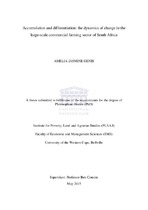| dc.description.abstract | The general image of large-scale commercial farming in South Africa is one of technological dynamism and international competitiveness. However, such a generalisation obscures considerable differentiation in terms of size, scale, capital reproduction strategies and future directions of change between and within farming regions. My study on reproduction, accumulation and differentiation in the large-scale commercial farming sector makes a small contribution towards explaining this substantive diversity, as well as the underlying processes at work, in three different agro-ecological regions of the country. A framework to analyse the strategies of large-scale commercial farmers was derived from volume 1 of Marx’s Capital and interpretations thereof by Marxist scholars, e.g. Ernest Mandel, Henry Bernstein, David Harvey, Ben Fine and Alfredo Saad-Filho. The four strategies or processes are broadly identified as a) expanding the scale or scope of production, in other words, to increase the capital intensity of production and/or geographic size, and/or the number of products, b) expanding the scale or scope of the business by expanding into new enterprises either up or down the value chain, c) increasing economic efficiency, which can be achieved by means of lowering the cost of commodity production, increasing productivity in terms of yield per hectare or per animal through technical and biological efficiency, or by organising workers and tasks to make workers as productive as possible, and d) taking part in political action in order to reduce uncertainties and/or establish preferential access to and control over key resources, markets or policy processes. Data from a questionnaire survey conducted with 141 large-scale commercial farmers in Limpopo, the Western Cape and Northern Cape provinces, as well as semi-structured interviews with 32 farmers in these regions were analysed to determine the most prevalent strategies and assess their outcomes. The outcomes of these strategies varied between and within regions and resulted in the differentiation of capitalist farmers into “accumulators”, “successful reproducers”, “struggling reproducers” and “simple commodity producers”. This approach helps to uncover processes and patterns of agrarian change, and provides a richer, more detailed, understanding of the dynamics of change in the large-scale farming sector of South Africa which can help inform debates on policy optionsfor the sector and for land reform. | en_US |

